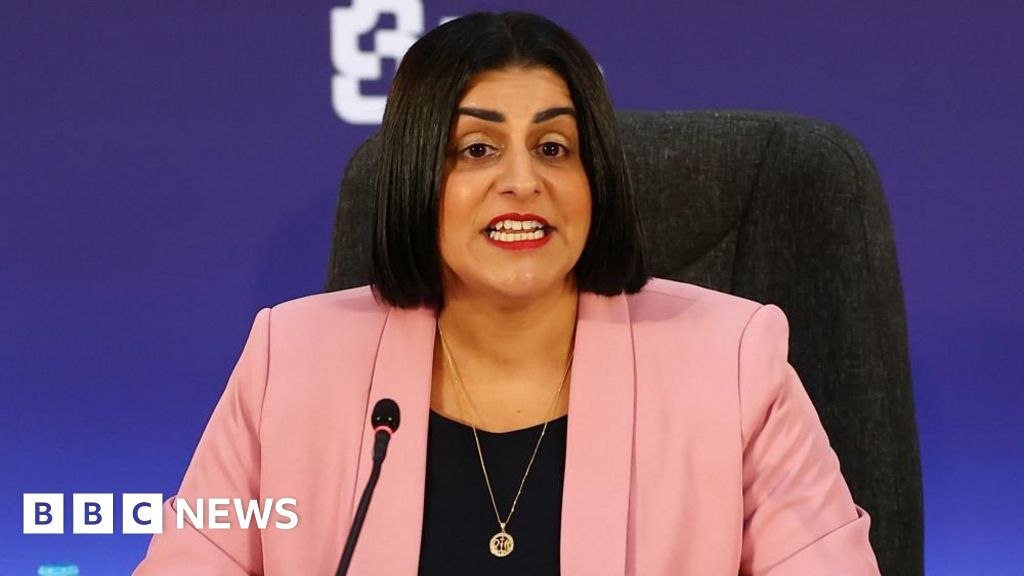Paul SeddonPolitical reporter
 PA Media
PA MediaNigel Farage says Reform UK would strip EU citizens of their rights to claim benefits, as he outlined plans to cut government spending by £20bn a year.
Farage said his party would renegotiate the last government’s Brexit deal to enable the move, claiming the agreement was unfairly one-sided.
He also set out plans to slash foreign aid to a minimum, and nearly triple the annual fee paid by visa applicants to use the NHS.
The Tories said unpicking the Brexit deal was a “ridiculous” idea, whilst Labour warned it could spark a trade war with Brussels.
Reform UK’s latest proposals come ahead of next week’s Budget, where Chancellor Rachel Reeves is widely expected to raise taxes.
At a press conference to unveil Reform’s plans, policy chief Zia Yusuf argued the party’s blueprint would lessen the need for tax hikes by making foreign nationals “bear the brunt” before British citizens were asked to “make sacrifices”.
The Brexit withdrawal deal signed by Boris Johnson in 2020 enabled EU citizens living in the UK before the end of a transition exit period to keep their rights to claim benefits.
This group made up 9.7% of those claiming universal credit in June 2025, according to provisional government statistics published for the first time in July.
Yusuf said if Reform won the next election, due by 2029, it would stop benefit payments to all foreign nationals after a “reasonable” three month notice period.
The party estimates restricting universal credit to British citizens only would save £6.4bn this year, rising to £10bn by the end of the decade.
A document on the plans circulated to journalists argued the Brexit treaty had been “one-sided”, as there were more Europeans claiming benefits in the UK compared to British citizens on the continent.
The Conservatives have also set out plans to stop paying benefits to foreign nationals, although they have stopped short of blocking EU citizens from claiming.
Speaking at a rival pre-Budget press conference, Conservative leader Kemi Badenoch said Reform’s idea of reopening the Brexit deal was a “bad idea”.
“We spent a lot of time negotiating those rights, not just for EU citizens in this country, but British citizens in other countries of the EU,” she said.
Adding that a “lot of pain and effort” had gone into negotiating the withdrawal deal, she said it was “completely ridiculous” for Farage to suggest Reform would renegotiate the settlement.
Labour chair Anna Turley also hit out at the plan, adding that it risked a “trade war with Europe” and “undoing” the government’s efforts to reduce trade frictions through a series of new deals with the EU.
In a BBC interview following his news conference, Farage said: “All I’m arguing for here is fairness. There is now a vastly disproportionate number of EU nationals in Britain being paid benefits to Brits abroad.”
He argued that the UK would be well-placed to renegotiate the Brexit deal because “we are still a crucial market for the European Union”, although he conceded “I’ve not pretended it would be easy”.
Asked about the prospect of retaliation from the EU if talks failed, he replied: “We can retaliate with tariffs. Two can play that game.”
“I don’t want to do that. But you need to have a renegotiation to get a fair reset with the European Union,” he added.
£1bn aid cap
Reform has also set out plans to cap overseas aid spending at £1bn a year, a new limit that would be written into law to prevent “stealth increases”.
This would be a huge reduction in spending – even given cuts in recent years, the aid budget stood at around £14bn last year, including just under £3bn spent on asylum seeker accommodation within the UK.
Reform says it would spend around £750m a year to retain British membership of international organisations such as the UN and World Bank, with the remainder spent on aid to Ukraine and a fund for “genuine disaster relief”.
As part of a proposed £20bn in spending cuts, it also plans to save £3.5bn a year by removing personal independence payments (Pip), a disability benefit, from those with “non serious anxiety issues”.
It also plans to raise around £5bn a year by hiking the immigration health surcharge, paid by visa applicants to cover NHS spending, from £2,718 a year from the current £1,035.
Reform pledged to make tax cuts worth around £90bn a year at the last election, but Farage rowed back on the plans earlier this month, arguing “substantial tax cuts” were not “realistic” given the state of public finances.




